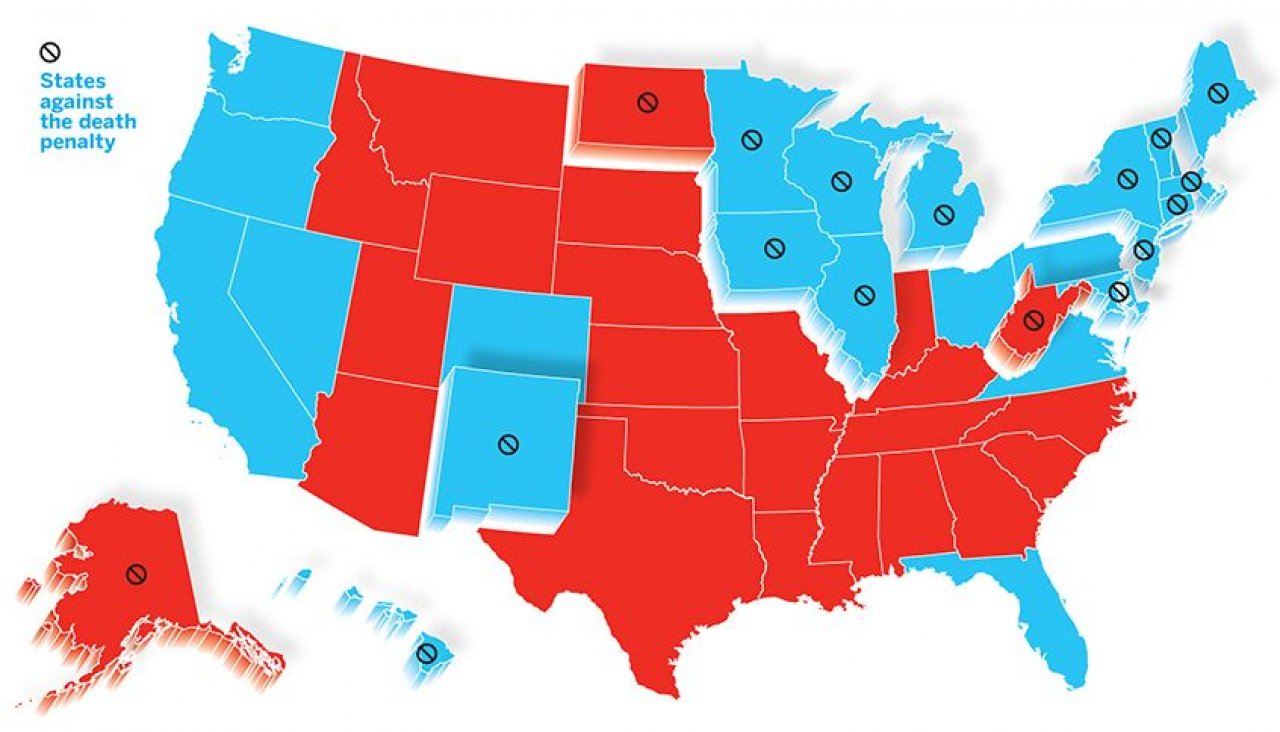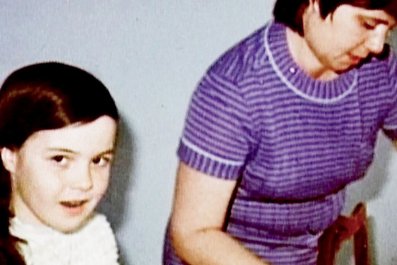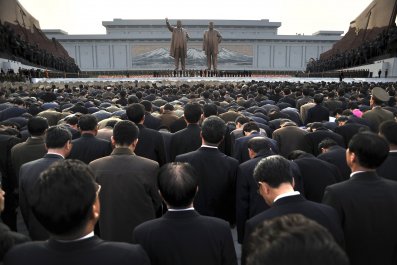Marc Hyden was a little nervous as he took the stage in February at a local Republican political conference in Buford, Georgia, where some 300 conservatives looked up at him skeptically. He was about to pitch them on why they should oppose the death penalty.
"Many of them looked at me a little weirdly," Hyden recalls. "Who is this guy? Is he a liberal acting as a conservative?"
He is not a liberal. A conservative Christian who most recently worked at the National Rifle Association, Hyden is one of two people leading a group called Conservatives Concerned About the Death Penalty. His mission is to convince Republicans that the death penalty fails a "conservative litmus test." Ultimately, the goal is to see it repealed in every state.
For decades, America has been a pro-capital-punishment country, with support growing over the 1970s and 1980s after the Supreme Court upheld the death penalty in 1976. Support peaked at 80 percent in 1994, according to Gallup. Since then, it has dropped, and today it is at its lowest point in 40 years. Last October, Gallup found support was at 60 percent. Eighteen states have abolished the death penalty, including six states since 2006, while others have imposed moratoriums or simply scaled back the number of executions.
States that do perform executions have had increasing difficulty procuring the drugs for lethal injections, leading to horrific incidents like Oklahoma's botched execution of Clayton Lockett last month. Advocates against the death penalty hope Lockett's torturous death and others like it will spur Americans to rethink their stance on capital punishment. They also believe DNA testing, which has helped exonerate some death row inmates, is a factor in changing perceptions about executions. A study in April indicated that at least 1 in 25 people sentenced to death is innocent.
But the GOP is still squarely in the pro-death-penalty camp. Ending capital punishment, which for years critics have argued disproportionately affects minorities, is considered a liberal issue. The Gallup poll showed 81 percent of Republicans support it, versus 47 percent of Democrats.
According to Hyden, that's because no one is talking to conservatives about the good reasons to oppose the death penalty. Since red states perform the majority of executions, ending the death penalty in the United States would ultimately require conservatives to get on board.
At the February "Conservatism Outside the Box" conference, which drew speakers on issues ranging from homeschooling to the states' right to nullify federal laws, Hyden walked the audience through his transformation from pro- to anti-death penalty.
Armed with a PowerPoint slideshow, he began with the pictures of men on death row who were executed before potentially exculpatory evidence was uncovered. Next, he hammered on the high costs of the death penalty, largely due to the costlier trials and prolonged appeal process in most cases, which sometimes force counties to commit the cardinal conservative sin of raising taxes. The state of California, for example, has, since 1978, spent $4 billion on death penalty cases and carried out 13 executions.
"This should be offensive to conservatives," Hyden told the crowd. "We're supposed to act as stewards of the taxpayers' hard-earned money."
He bolstered his speech with quotes from prominent conservatives such as former U.S. Representative Ron Paul of Texas and columnist George Will, whose concerns about the death penalty might come as a surprise to some conservatives.
"Halfway through I could see there was a change in people," Hyden says. "Once I was finished, I kept having people walk up to me telling me that in the morning they walked into the convention center supporting the death penalty, and now they're leaving either opposed to the death penalty or not quite sure where they stand on it anymore."
Jason Thompson (Hyden's uncle), the head of the Georgia Republican Party's Seventh District Committee and the organizer of the conference, says the conservative movement is very open to his nephew's pitch. Thompson, who is also Hyden's uncle, still supports the death penalty but believes it needs repairs.
"If you can't really trust government to fill a pothole, how can you trust government do the right thing on a life and death decision?" Thompson asks. "When you come at it from that perspective, people start really thinking about it and changing their minds. There's really such a distrust of government right now."
Ballard Everett, a Republican consultant in North Carolina who is leading a group of anti-death-penalty conservatives in his state, has also found the cost angle sways conservatives. "That's really having an impact on some of the Republicans we've seen," he says. Everett's group aims to raise awareness about the problems with the death penalty and ultimately replace capital punishment in North Carolina with life without parole. His group is one of nearly a dozen state-level organizations that work closely together, with support from Hyden's group, to raise awareness and push legislation in their states.
Hyden says the North Carolina spinoff, which is preparing to woo conservatives at next month's North Carolina GOP convention, could be just a few years away from repealing the death penalty. He points to Kentucky, Montana, Kansas and Nebraska as states with strong conservative opposition to the death penalty. But in other conservative states, he concedes, it might take more than a decade to end capital punishment.
Since the 1980s, Republicans have embraced a tough-on-crime stance that persists to this day. Their zeal for the death penalty was on full display in 2011, when Texas Governor Rick Perry drew massive applause during a GOP presidential primary debate for the record number of executions under his watch. "You will face the ultimate justice in the state of Texas, and that is you will be executed," Perry said. Texas has executed 515 people since reinstating the death penalty in 1974, more than any other state, and currently has 287 on death row. In his more than 13 years in office, Perry has overseen over 270 executions, including the controversial case of Cameron Todd Willingham, who many believe was innocent.
The politics of the death penalty remain tricky, even for Democrats. President Barack Obama commissioned a Justice Department review after Lockett's botched execution, but continues to support the death penalty in some cases. "In the application of the death penalty in this country, we have seen significant problems—racial bias, uneven application of the death penalty, you know, situations in which there were individuals on death row who later on were discovered to have been innocent because of exculpatory evidence," Obama said after Lockett's execution. Black people make up 41 percent of death row inmates but only about 12 percent of the U.S. population.
Hyden believes it is no longer taboo for Republicans to be against the death penalty, particularly as there is growing momentum behind the need for wider reform of the criminal justice system.
Though Perry has become for many the public face of the death penalty, he is also one of a number of prominent Republicans pushing criminal justice reform as a conservative cause. At this year's Conservative Political Action Conference (CPAC), the largest annual gathering of conservatives, Perry touted his state's cost-saving rehabilitation programs.
"We are not a soft on crime state, but I hope we get the reputation of being a smart on crime state," Perry said. "We shut a prison down last year.… You want to talk about real conservative governance, shut a prison down."
Perry is not alone. His view is backed by such organizations as Right on Crime, a conservative group in favor of reform. Sitting alongside Perry at CPAC, anti-tax evangelist Grover Norquist called criminal justice reform "our chance to show we can provide solutions to affect significant problems." And on Capitol Hill, Republican Sen. Rand Paul, Ron's son and a Tea Party hero, has made reforming mandatory minimum drug sentences a centerpiece of his agenda.
"They changed the narrative, and they made it okay for conservatives to say, 'The criminal justice system is not working,'" Hyden says. "That has really opened the path for us to have this discussion about the death penalty."
Everett, the North Carolina Republican, says, "A lot of people like myself have always felt that if you're going to be tough on crime, you've got to execute them." But recently he's begun to learn more about life without parole and believes it is plenty tough.
"I think people are beginning to realize they can be tough on crime without executing someone."


























